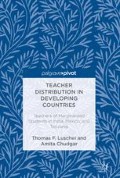Abstract
We begin this chapter by discussing key areas where the misalignment of demand and supply results in an inequitable distribution of teachers. These areas include the use or lack of salary and incentives, seniority-based transfers, and improper or corrupt practices. We then offer examples from our research of promising efforts to align the demand and supply sides to ensure greater access by marginalized children to qualified teachers. We discuss the importance of ensuring equity in teacher assignments and transfers, recognizing and acting on teacher preferences, carefully designing incentives, giving voice to marginalized children and their communities, investing in local infrastructure and human capital, and involving civil society to act as an intermediary between the demand and supply sides. Using these examples as a foundation for future action, we offer a set of recommendations to work toward more equitable access of marginalized children to qualified teachers. Finally, we discuss the study’s limitations and offer areas for future research.
Access this chapter
Tax calculation will be finalised at checkout
Purchases are for personal use only
References
Akiba, M., LeTendre, G. K., & Scribner, J. P. (2007). Teacher quality, opportunity gap, and national achievement in 46 countries. Educational Reseacher, 36(7), 369–387.
Andrabi, T., Das, J., & Khwaja, A. I. (2008). A dime a day: The possibilities and limits of private schooling in Pakistan. Comparative Education Review, 52(3), 329–355.
Asadullah, M. N., & Chaudhury, N. (2013). Peaceful coexistence? The role of religious schools and NGOs in the growth of female secondary schooling in Bangladesh. Journal of Development Studies, 49(2), 223–237. doi:10.1080/00220388.2012.733369.
Banerjee, A., Cole, S., Duflo, E., & Linden, L. (2004). Remedying education: Evidence from two randomized experiments in India. Working Paper 11904. Cambridge, MA: National Bureau of Economic Research.
Boyd, D., Grossman, P., Lankford, H., Loeb, S., & Wyckoff, J. (2009). Teacher preparation and student achievement. Educational Evaluation and Policy Analysis, 31(4), 416–440.
Chaboux, C. (2005). Meeting EFA: Bangladesh Rural Advancement Committee (BRAC) primary schools. Academy for Educational Development. Academy for Educational Development. Retrieved from http://eric.ed.gov/?id=ED497021
Cumsille, B., & Fiszbein, A. (2015). Creme de la creme: The Teach for All experience and its lessons for policy-making in Latin America. Education Policy Analysis Archives, 23(46), 1–23.
Islam, M. N., & Anwar, A. (2012). BRAC in Afghanistan: Building South-South partnerships in teacher training. PROSPECTS, 42(1), 55–70. doi:10.1007/s11125-012-9222-1.
Kang, N. H., & Hong, M. (2008). Achieving excellence in teacher workforce and equity in learning opportunities in South Korea. Educational Reseacher, 37(4), 200–207.
Little, A. (2004). Learning and teaching in multigrade settings. Background paper prepared for the Education for All Global Monitoring Report 2005. Paris, France: UNESCO.
Luschei, T. F., & Chudgar, A. (2015). Background report for Education for All Global Monitoring Report 2015: Evolution of policies on teacher deployment to disadvantaged areas. Submitted to UNESCO. New York: UNESCO.
Luschei, T. F., Chudgar, A., & Rew, J. W. (2013b). Exploring differences in the distribution of teacher qualifications across Mexico and South Korea: Evidence from the Teaching and Learning International Survey. Teachers College Record, 115, 1–38. Retrieved from http://www.tcrecord.org/DefaultFiles/SendFileToPublic.asp?ft=pdf&FilePath=c:\WebSites\www_tcrecord_org_documents\38_16964.pdf&fid=38_16964&aid=2&RID=16964&pf=Content.asp?ContentID=16964
Sen, A. (1990). More than 100 million women are missing. New York Review of Books. Retrieved from http://www.nybooks.com/articles/archives/1990/dec/20/more-than-100-million-women-are-missing/
Straubhaar, R., & Friedrich, D. (2015). Theorizing and documenting the spread of Teach For All and its impact on global education reform. Education Policy Analysis Archives, 23(44). doi:10.14507/epaa.v23.2055.
Vegas, E., & Umansky, I. (2005). Improving teaching and learning through effective incentives: What can we learn from education reforms in Latin America? Washington, DC: World Bank.
Author information
Authors and Affiliations
Copyright information
© 2017 The Author(s)
About this chapter
Cite this chapter
Luschei, T.F., Chudgar, A. (2017). Good Teachers for All: Toward a More Just Distribution of Teachers. In: Teacher Distribution in Developing Countries. Palgrave Macmillan, New York. https://doi.org/10.1057/978-1-137-57926-3_6
Download citation
DOI: https://doi.org/10.1057/978-1-137-57926-3_6
Published:
Publisher Name: Palgrave Macmillan, New York
Print ISBN: 978-1-137-57925-6
Online ISBN: 978-1-137-57926-3
eBook Packages: EducationEducation (R0)

